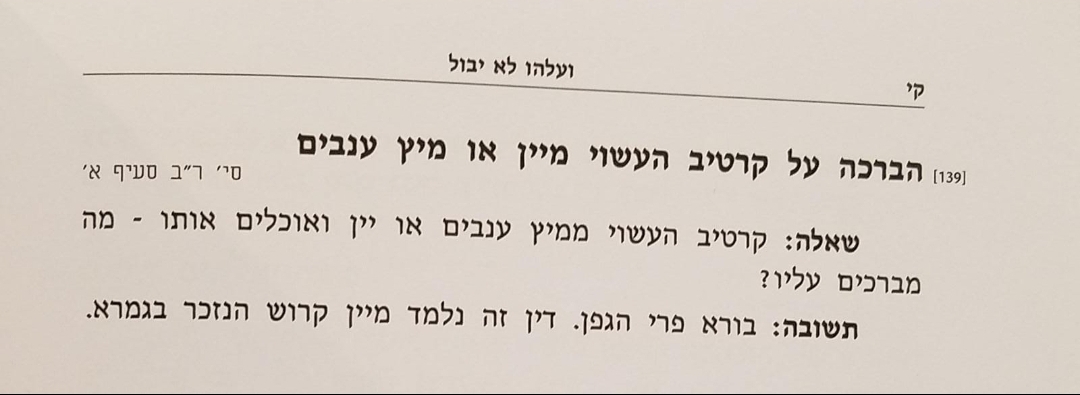For a cold dessert, I often like to freeze a cup of grape juice and then eat it with a spoon like an Italian ice. What is the appropriate bracha to say before and after eating this delicacy?
-
Some wines are made from gape juice that has been concentrated down to the form of semi solid, (cube), and at a later date reconstituted and fermented to wine. What should be the brocho over that kind of wine?– user643Commented Jun 1, 2011 at 21:35
-
@AvrohomH, Welcome to Judaism.SE! I recommend that you post your question as a new question, possibly referring to this one as its inspiration. If you can refer in the question to examples of the wines you're talking about, and/or to a writeup of the process, that'd be cool.– Isaac Moses ♦Commented Jun 1, 2011 at 21:47
-
@AvrohomH, Please use the "Add Comment" button to comment or reply to comments.– Isaac Moses ♦Commented Jun 2, 2011 at 15:42
4 Answers
"There is a huge machlokes in the Poskim regarding exactly this issue if grape juice only maintains its special status as a liquid or even when hardened. Therefore, it would be ideal to make borei pri hagafen on liquid grape juice and shehakol on something else before eating the ices. In the likelihood that this is not practical, one should say shehakol." http://revach.net/ask/article.php?id=1205
"Grape Juice Ices: According to The Halachos of Brachos (Rabbi Binyomin Forst, Shlita), "Frozen grape juice (i.e., grape ices) or wine may have lost its status as wine since it was transformed into solid food. One should therefore not recite a Borei P'ri Hagofen either on frozen wine or wine that was thickened into solid form."" http://www.aishdas.org/avodah/vol09/v09n080.shtml
"The proper bracha for grape ices is Shehakol. (Laws of Brachos p. 313)" http://www.mevaseret.org/mmy/searchshiurim.php?shiur=259
I don't know for certain (CYLOR, of course), but some possible relevant sources:
Rambam (Hil. Nezirus 5:2) groups together wine and "coagulated wine," classifying them both as "fruit" (as opposed to vinegar, which is considered "waste products of the fruit").
In a few places the Gemara also refers to "coagulated wine." Two of these (Sukkah 49a and Me'ilah 11b) are referring to the residue remaining in the drainpipes (shisin) under the Altar, which was cleaned out and burned "once every seventy years." The other two (Sukkah 12a and Sotah 48b) speak of "coagulated wine that comes from Senir" - which might indeed be the same as your delicacy, as Senir is Mount Hermon, which is snowcapped all year round. Evidently, though, even when solidified it can still be called "wine."
Based on all of this, then, it would seem that freezing grape juice doesn't downgrade its status, and it should keep the same berachah. (Indeed, freezing it is less of a change than drying it out, since frozen juice will melt but dried-out wine can't necessarily be reconstituted.)
(Incidentally, if "coagulated wine that comes from Senir" means wine ices, then you've rediscovered something quite important; the Gemara in Sotah there says that this hasn't been available since the destruction of the first Beis Hamikdash!)
Rav Shlomo Zalman Aurbach held that grapejuice or wine ices is not downgraded brachawise and one should make a borei pri hagafen.
Text:

According to some poskim, the correct berachah will be shehakol. This is ruled by the Birkei Yosef (Orach Chaim 202:2), Ben Ish Chai (Year 1, Matos 10), Shevet Halevi (9:39, who rules that shehakol should be made on account of a safek), and Sheraga Hameir (3:32; 8:113).
However, it appears that most poskim rule that the blessing is borei peri hagafen. This was the ruling given by Rav Shlomo Zalman Auerbach (cited in Ve-aleihu lo Yibol, Vol. 1, p. 110), Kinyan Torah Behalachah (2:108), Shevet Hakehasi (6:123), Rav Chaim Kanievsky (Aseifas Yitzchak, Cheshvan 5768), Mekor Haberachah (Shut 2), and Avnei Yashfei (ibid., Kislev 5768), who explains that because the ice is licked, the manner of consumption is drinking, and therefore the blessing is surely hagafen, and adds that even if the ice is bitten and chewed, hagafen should be made (based on the principle that this berachah is valid bedieved even for grapes).
Some poskim leave the matter as being a safek: See Peri Megadim (Eishel Avraham 202:11, who writes that the question is whether to make a hagafen or borei peri ha’eitz); see also Sha’arei Haberachah 18:8; Chukei Chaim, Orach Chaim 3:38.
The most difficult aspect is the final bracha, since borei nefashos cannot cover an Al Hagefen, especially that some poskim maintain that the bracha of maain shalosh, al hagfen, is doireisa, biblically mandated.
Therefore, although the issue remains unresolved, it appears that one who makes borei peri hagafen (certainly for licking the ices, and even for chewing them) is acting properly.
Nonetheless, it’s best to add a large amount of other liquids to avoid the shailah.
